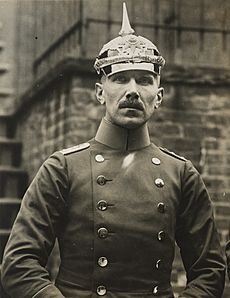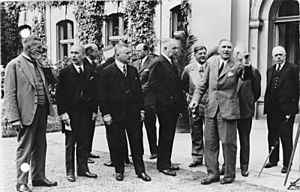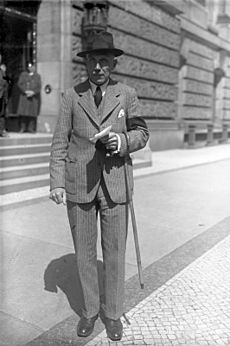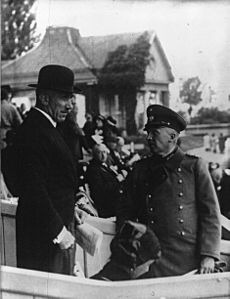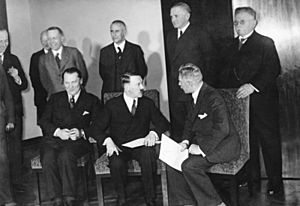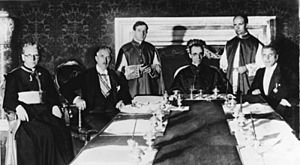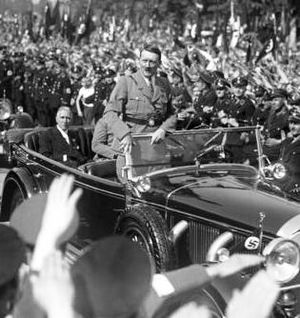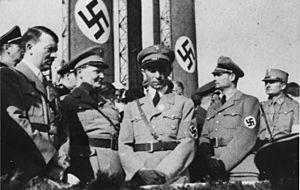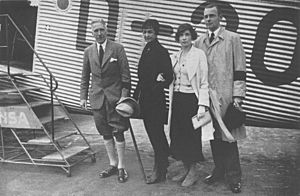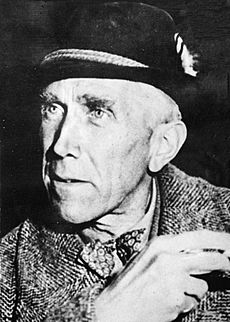Franz von Papen facts for kids
Quick facts for kids
Franz von Papen
|
|
|---|---|
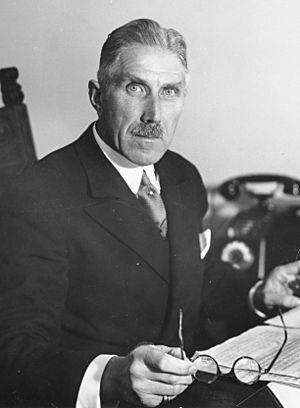
Papen in 1933
|
|
| Chancellor of Germany (Weimar Republic) |
|
| In office 30 May 1932 – 17 November 1932 |
|
| President | Paul von Hindenburg |
| Preceded by | Heinrich Brüning |
| Succeeded by | Kurt von Schleicher |
| Ambassador of Germany to Turkey | |
| In office April 1939 – August 1944 |
|
| Nominated by | Adolf Hitler |
| Preceded by | Friedrich von Keller |
| Succeeded by | Wilhelm Haas (1952) |
| Ambassador of Germany to Austria | |
| In office August 1934 – February 1938 |
|
| Nominated by | Adolf Hitler |
| Preceded by | Kurt Rieth |
| Succeeded by | Carl-Hermann Mueller-Graaf (1952) |
| Vice-Chancellor of Germany | |
| In office 30 January 1933 – 7 August 1934 |
|
| Chancellor | Adolf Hitler |
| Preceded by | Hermann Dietrich |
| Succeeded by | Franz Blücher (1949) |
| Reichskommissar of Prussia | |
| In office 30 January 1933 – 10 April 1933 |
|
| Preceded by | Kurt von Schleicher |
| Succeeded by | Hermann Göring |
| In office 20 July 1932 – 3 December 1932 |
|
| Preceded by | Otto Braun |
| Succeeded by | Kurt von Schleicher |
| Personal details | |
| Born | 29 October 1879 Werl, Prussia, German Empire |
| Died | 2 May 1969 (aged 89) Sasbach, West Germany |
| Resting place | Wallerfangen, Germany |
| Political party | Centre Party (1918–1932) Independent (1932–1938) Nazi Party (NSDAP; 1938–1945) |
| Spouse |
Martha von Boch-Galhau
(m. 1905; died 1961) |
| Children | Friedrich
Antoinette Isabella Margaret Stephanie |
| Alma mater | Preußische Hauptkadettenanstalt |
| Profession | Diplomat, military officer |
| Signature |  |
| Military service | |
| Allegiance | |
| Branch/service | Imperial German Army |
| Years of service | 1898–1919 |
| Rank | Lieutenant-colonel |
| Battles/wars | World War I |
| Awards |
|
Franz von Papen (born October 29, 1879 – died May 2, 1969) was a German politician and diplomat. He came from a wealthy noble family and served as a military officer. Papen was the Chancellor of Germany in 1932. Later, he became the Vice-Chancellor of Germany under Adolf Hitler from 1933 to 1934.
Papen joined the Prussian Army in 1898 and became a trained officer. He worked as a military diplomat in Mexico and the United States from 1913 to 1915. After being sent back from the United States, he fought in World War I on the Western Front and in the Middle East.
In 1932, President Paul von Hindenburg chose Papen to be Chancellor. Papen tried to rule by special presidential orders. He helped end Germany's war payments at a meeting in Lausanne. However, he couldn't get enough support in the German parliament (the Reichstag). This led to his removal and replacement by General Kurt von Schleicher.
Papen wanted to return to power. He believed he could control Adolf Hitler if Hitler was part of the government. So, he convinced President Hindenburg to make Hitler Chancellor and himself Vice-Chancellor in 1933. Papen thought this new government would not be fully controlled by the Nazi Party. But Hitler and his allies quickly pushed Papen aside. Papen left the government in 1934 after a violent event called the Night of the Long Knives, where some of his friends were killed by the Nazis.
After this, Papen served as Germany's ambassador in Vienna (Austria) from 1934 to 1938 and in Ankara (Turkey) from 1939 to 1944. After World War II, he was tried at the Nuremberg Trials but was found not guilty of war crimes. However, a German court later found him responsible for some actions related to the Nazi government. He was sentenced to prison but was released after an appeal. Papen passed away in 1969.
Contents
Early Life and Military Career
Franz von Papen was born into a rich and noble Catholic family in Werl, Germany. He chose to go to a military cadet school at age 11. He trained there for several years and later became a second lieutenant in the army. In 1913, he joined the German General Staff as a captain.
In 1905, Papen married Martha von Boch-Galhau. Her family was very wealthy, which made Papen a rich man. He was known for being a good horseman and having a lot of charm. He was proud of his family's long history and believed that noble people were superior to commoners. Papen could speak French and English and traveled widely. He was a strong believer in military power throughout his life.
Diplomatic Work in the United States
In December 1913, Papen became a diplomat, serving as a military attaché for Germany in the United States. He also traveled to Mexico, where he observed the Mexican Revolution.
During World War I, Papen tried to buy weapons for Germany in the United States. He also hired a private detective to plan attacks against businesses in New York that belonged to countries fighting against Germany. Papen tried to stop Britain, France, and Russia from buying war supplies in the U.S. He even set up a fake company to buy all the hydraulic presses in the U.S. This would limit how many artillery shells could be made for the Allies. He also helped German citizens in the Americas get fake U.S. passports to return home.
Papen used his diplomatic status to plan an invasion of Canada and attacks on canals, bridges, and railroads. He was also involved in helping anti-British Indian groups get weapons. His activities were known to British and U.S. intelligence. Because of this, he was expelled from the United States in December 1915. He was given the Iron Cross when he returned to Germany.
Army Service in World War I
Papen returned to active military service during World War I. He first served on the Western Front. In 1916, his battalion fought bravely and suffered many losses during the Battle of the Somme. He also fought at Vimy Ridge in 1917, where his unit faced heavy defeat.
After Vimy Ridge, Papen asked to be transferred to the Middle East. From June 1917, he served as an officer in the Middle East, working with the Ottoman army in Palestine. He took part in intense fighting in the Sinai and Palestine Campaign. He was promoted to lieutenant-colonel and left the army soon after the war ended in November 1918.
Political Career in Germany
After leaving the army, Papen bought a country estate and became involved in politics. He rejoined the Centre Party, which most German Catholics supported. Papen was a monarchist (someone who supports having a king or queen) and a conservative. He wanted to shift his party more to the right. He was an important figure in the party, being the largest shareholder and head of the editorial board for the party's main newspaper.
Papen was a member of the Prussian parliament (the Landtag) from 1921 to 1928 and again from 1930 to 1932. He often voted against his own party's decisions. In the 1925 presidential election, he supported the right-wing candidate Paul von Hindenburg instead of his party's candidate.
In 1930, Papen welcomed the idea of a "presidential government," where the president would have more power. He wanted the government to rely on the support of the Nazi Party instead of the Social Democrats.
Becoming Chancellor
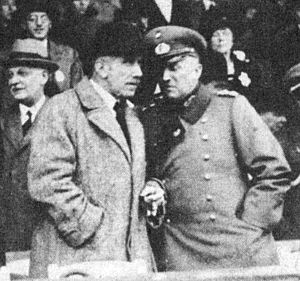
On June 1, 1932, President Hindenburg suddenly appointed Papen as Chancellor of Germany. This appointment was largely due to General Kurt von Schleicher, an old friend of Papen's and a key advisor to Hindenburg. Schleicher believed Papen's background would help form a coalition between the Centre Party and the Nazis. Papen had promised his party he wouldn't accept the role, so he resigned from the Centre Party the day before becoming Chancellor.
Papen's government was called the "cabinet of barons" because many members were from noble families. He had very little support in the German parliament (the Reichstag). Only a few small conservative parties supported him. The Centre Party refused to support him because he had gone against them.
Papen agreed with Hitler and Hindenburg that the Nazi Party would support his government if new elections were held, the ban on the Nazi stormtroopers (SA) was lifted, and Nazis got access to radio. Papen dissolved the Reichstag and called for new elections in July 1932. He hoped the Nazis would win many seats, giving him the majority he needed to create a strong government. He planned to rule by special emergency orders signed by President Hindenburg.
In July 1932, Papen represented Germany at the Lausanne conference. There, Germany's obligation to pay war reparations was cancelled. Papen took credit for this success. He also put in place economic policies that cut unemployment benefits and lowered wages, which made him very unpopular with ordinary people.
On July 20, Papen launched a coup against the Social Democratic government of Prussia. This event, called the Preußenschlag, weakened Germany's democracy. Papen declared himself Commissioner of Prussia. He saw this as a gift to the Nazis, hoping they would support his government.
In the July 31 Reichstag election, the Nazis won the most seats. Papen tried to control the rising violence from Nazi stormtroopers by introducing a new law that sped up death penalty cases. However, when five Nazi SA men were sentenced to death for murder, Hitler demanded their release. Papen gave in and changed their sentences to life imprisonment.
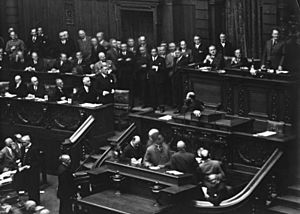
On September 12, 1932, the Reichstag voted no-confidence in Papen's government by a large margin. Papen decided to call another election. In November 1932, the Nazis lost seats in the election, but Papen still couldn't get enough support. Under pressure, Papen resigned on November 17. He wanted to declare martial law and rule as a dictator. However, military leaders told him it would be impossible to control the Nazis and Communists. President Hindenburg then appointed Kurt von Schleicher as Chancellor instead of Papen.
Bringing Hitler to Power
After his resignation, Papen often visited Hindenburg and spoke badly about Schleicher. Papen was determined to become Chancellor again. On January 4, 1933, Hitler and Papen met secretly to plan against Schleicher.
Papen convinced Hindenburg to form a new government with Hitler. On January 22, Papen agreed to support Hitler as Chancellor, with himself as Vice-Chancellor and Minister-President of Prussia. Papen believed he could control Hitler once he was in power. He famously said, "In two months, we'll have pushed Hitler so far into the corner that he'll squeal."
On January 30, 1933, President Hindenburg appointed Hitler as Chancellor, with Papen as Vice-Chancellor. At first, only three Nazis were in Hitler's cabinet. The other eight positions were held by conservatives close to Papen. Papen also had the right to attend every meeting between Hitler and Hindenburg. He thought these things would keep Hitler in check.
Serving as Vice-Chancellor
However, Hitler and his allies quickly pushed Papen and the other conservatives aside. For example, Hermann Göring became the interior minister of Prussia, giving the Nazis control of Germany's largest police force. Göring often acted without consulting Papen.
Papen did not fight against the Reichstag Fire Decree in February or the Enabling Act of 1933 in March. These laws gave Hitler much more power. After the Enabling Act passed, cabinet meetings became less important, and Papen's plan to control Hitler through the cabinet failed.
In March 1933, Papen supported Hitler's plan to weaken the Centre Party by making a deal with the Catholic Church. This led to the Reichskonkordat, an agreement between Germany and the Vatican, which Papen helped negotiate in Rome. Papen believed this agreement was a great success that protected German Catholics and led to the Centre Party being disbanded.
Papen also played a role in the 1935 Saar status referendum. The Saarland region was under the control of the League of Nations. Papen gave many speeches urging the people of Saarland to vote to return to Germany. His efforts were successful, and 90% of Saarlanders voted to rejoin Germany.
By May 1934, President Hindenburg was very ill. Papen, along with Hindenburg's chief of staff and son, wrote a "political will" for the president. This will asked for some Nazi ministers to be removed and for regular cabinet meetings, which would have given more power back to the conservatives.
The Marburg Speech
On June 17, 1934, Papen gave a famous speech at the University of Marburg. In this speech, he called for more freedoms, an end to calls for a "second revolution," and an end to the violence by the Nazi stormtroopers (SA). Papen hoped this speech would make Hitler control the SA.
Hitler was very angry about the speech and tried to stop it from being published. Papen told Hitler that he would resign if the ban on his speech wasn't lifted and if Hitler didn't agree with his ideas. Hitler pretended to agree with Papen and promised to lift the ban and control the SA. Papen agreed not to resign.
Night of the Long Knives
Two weeks after the Marburg speech, Hitler acted against the SA leadership in what became known as the Night of the Long Knives. This was a violent purge that took place between June 30 and July 2, 1934. During this time, Papen's office was searched by the SS (Hitler's protection squad), and his close friends and associates were shot and killed. Papen himself was placed under house arrest.
Papen later went to Hitler and resigned, saying his service to Germany was over. His resignation was accepted, and no one was appointed to replace him as Vice-Chancellor. When Hindenburg died on August 2, the last major obstacle to Hitler's full control was gone.
Ambassador to Austria
Hitler then offered Papen the job of German ambassador to Vienna, Austria, which Papen accepted. Papen believed that Austria should join Germany. During his time as ambassador, Papen reported directly to Hitler, not to the Foreign Office.
Papen often met with Austrian Chancellor Kurt Schuschnigg to assure him that Germany did not want to annex Austria. He said Germany only wanted the banned Austrian Nazi Party to be allowed in Austrian politics. Papen played a big part in negotiating the 1936 Austro-German agreement. This agreement stated that Austria was a "German state" and its foreign policy would align with Germany's. It also allowed members of the "national opposition" (including Nazis) into the Austrian cabinet. This treaty greatly reduced Italy's influence on Austria. Papen told Hitler that this treaty was a "decisive step" towards ending Austrian independence.
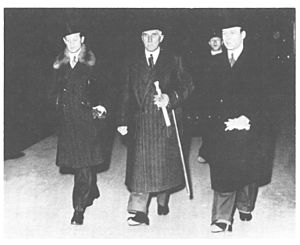
In 1937, Papen pressured Austria to include more Nazis in its government. Although he was dismissed from his role in Austria in February 1938, Hitler asked him to arrange a meeting with Schuschnigg. The demands Hitler made at this meeting led to Austria giving in to German pressure, paving the way for the Anschluss (annexation) of Austria by Germany.
Ambassador to Turkey
Papen later served as Germany's Ambassador to Turkey from 1939 to 1944. The Turkish president at first did not want Papen as ambassador, but eventually accepted him in April 1939.
Papen arrived in Turkey just after Turkey signed a friendship agreement with the UK. Turkey wanted to join a "peace front" to stop Germany. Papen tried to pressure Turkey not to join the Allies. When Germany invaded Poland in September 1939, Papen claimed he was against Hitler's foreign policy. However, he continued his work as ambassador.
In October 1939, Turkey signed an alliance treaty with France and the UK. Papen then worked with Soviet diplomats to try and keep Turkey from joining the war on the Allied side. After France was defeated in June 1940, Papen's influence in Turkey grew.
Between 1940 and 1942, Papen signed economic agreements that brought Turkey into Germany's economic control. In June 1941, he successfully negotiated a Treaty of Friendship and Non-aggression with Turkey. This treaty prevented Turkey from entering the war on the Allied side.
In February 1942, Papen survived an assassination attempt by Soviet agents in Ankara. A bomb exploded too early, killing the bomber but only slightly injuring Papen. In 1943, Papen helped prevent the UK from getting Turkey to join the war. He did this by having Hitler send a letter to the Turkish president, assuring him Germany would not invade Turkey. He also threatened that the German air force (Luftwaffe) would bomb Istanbul if Turkey joined the Allies.
In 1943, Papen had secret meetings with U.S. agents, exaggerating his power in Germany. He asked for U.S. support to make him dictator of Germany after Hitler. However, U.S. President Franklin D. Roosevelt rejected this offer. In 1944, Turkey stopped selling important materials to Germany and then cut off diplomatic relations, forcing Papen to return to Berlin.
Later Life and Legacy
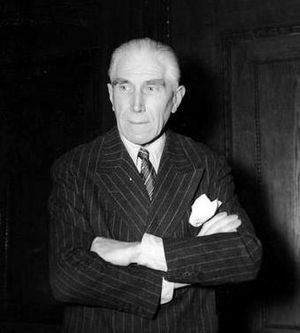
Papen was captured by U.S. forces in April 1945. He was forced to visit a concentration camp to see the horrors of the Nazi regime he had served.
Papen was one of the defendants at the main Nuremberg War Crimes Trial. The court found no strong evidence that he was involved in the annexation of Austria. He was found not guilty of war crimes, though the court noted he had committed "political immoralities."
Later, a West German court sentenced Papen to eight years of hard labor, but he was released on appeal in 1949. He tried to restart his political career in the 1950s but was unsuccessful.
Papen wrote several books and memoirs, defending his actions. He continued to give speeches and write articles until his death in 1969, always defending himself against the charge that he helped bring Hitler to power and served a criminal government. Franz von Papen died in Obersasbach, West Germany, at the age of 89.
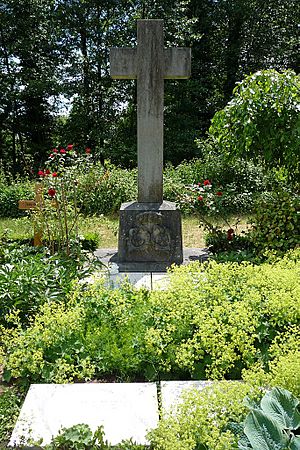
Images for kids
See also
 In Spanish: Franz von Papen para niños
In Spanish: Franz von Papen para niños
- List of Nazi Party leaders and officials
 | Percy Lavon Julian |
 | Katherine Johnson |
 | George Washington Carver |
 | Annie Easley |


